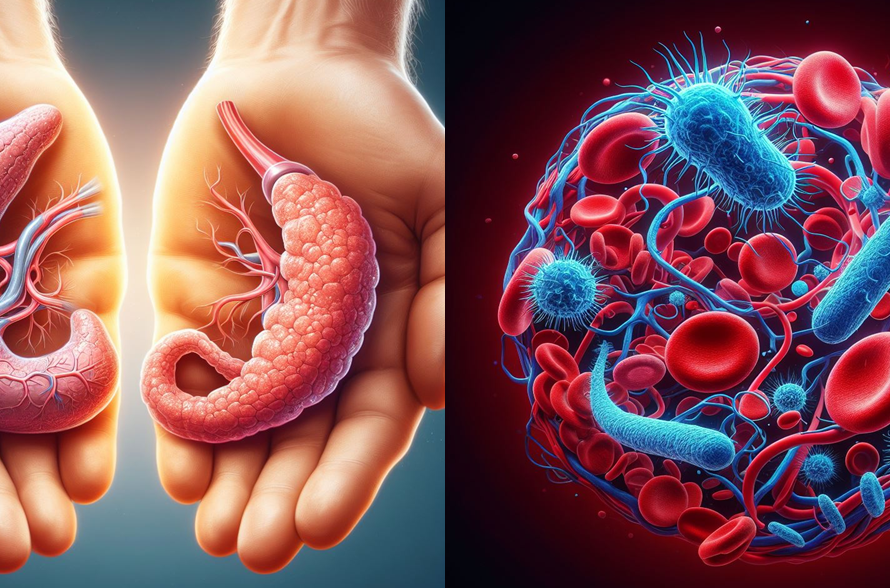The human body is home to a hidden world of trillions of microorganisms known as the gut microbiome. These tiny creatures, mainly bacteria, are now thought to have a significant impact on our health, with emerging research linking them to autism spectrum disorder (ASD).
A recent groundbreaking study published in Nature Microbiology has brought attention to a potential link between gut bacteria and ASD. The research findings revealed that individuals diagnosed with ASD possess a distinct composition of gut microbiome compared to those without the condition. This unique “bacterial fingerprint” points towards the possibility that the gut microbiome may influence the development of ASD.
In a newly published study, researchers at the University of California, San Diego have discovered that gut bacteria may play a role in autism. The study, published in the journal Nature Microbiology, found that people with autism have a different gut microbiome than people without the disease. The researchers also found that transplanting gut bacteria from people with autism to mice can lead to autistic-like behaviours in the mice. The study’s lead author, Dr. Sarkis Mazmanian, says that the findings could have a major impact on our understanding of autism and lead to new treatments for the condition. “This is a very significant finding,” says Mazmanian. “It suggests that the gut microbiome may be a contributing factor to autism and that it could be a target for new therapies.” Their findings revealed a distinct difference in the composition of gut bacteria between the two groups. Individuals with ASD exhibited a lower abundance of beneficial bacteria and an increased presence of potentially harmful bacteria. This altered gut microbiome, the researchers suggest, may contribute to the development of ASD by influencing brain function and behaviour. The new study is the first to show that the gut microbiome is also different in people with autism. The researchers analysed the gut microbiomes of more than 200 people with autism and found that they had a lower diversity of bacteria than people without the disease. They also found that people with autism had higher levels of certain types of bacteria, such as Bacteroidetes and Firmicutes.
How Gut Bacteria Might Influence ASD:
The study suggests that an imbalance in the gut microbiome, characterized by lower levels of beneficial bacteria and higher levels of potentially harmful ones, might contribute to ASD in several ways:
Inflammation: Certain gut bacteria can trigger inflammation, potentially damaging brain cells.
Immune System: Gut bacteria interact with the immune system, and an altered immune response might play a role in ASD development.
Metabolism: Gut bacteria play a vital role in metabolism, and disruptions in this process might contribute to the behavioral and cognitive challenges seen in ASD.
A Ray of Hope: Can We “Rebalance” the Gut Microbiome?
While the exact mechanisms remain under investigation, this research paves the way for exciting possibilities:
- Dietary Modulation: Consuming prebiotic fibres like fruits and vegetables promotes the growth of beneficial bacteria that produce anti-inflammatory compounds and support a healthy gut barrier. Probiotics, like yogurt with live cultures, can directly increase the diversity and quantity of helpful bacteria.
- Exercise: Regular physical activity can positively affect the gut microbiome by increasing gut motility and blood flow, potentially influencing brain function through the release of mood-boosting neurotransmitters.
- Stress Management: Techniques like deep breathing, yoga, and meditation can help reduce stress, which can have a positive impact on both the gut and the brain.
Gut Microbiome: A Key Player
The gut microbiome is a community of microorganisms that resides in the gastrointestinal tract. It plays a significant role in the gut-brain axis, which is the communication pathway between the gut and the brain. The microbiome’s composition and function can affect the brain in several ways. Firstly, microbes produce metabolites, such as short-chain fatty acids (SCFAs), which can directly or indirectly affect brain function. Secondly, the microbiome interacts with the immune system, which can trigger inflammatory responses and influence brain signaling. Finally, microbes can affect the production of neurotransmitters, such as serotonin and dopamine, which are responsible for regulating mood and behavior..
Gut Microbiome and ASD: Potential Mechanisms
Individuals with ASD have been observed to have an altered gut microbiome, which may contribute to the disorder through several mechanisms. Firstly, certain gut bacteria can trigger inflammation in the gut, which can lead to the production of inflammatory molecules that can damage brain cells. Secondly, gut bacteria can influence the immune system, which plays a critical role in brain development and function. Alterations in the immune system may contribute to the neurodevelopmental abnormalities seen in ASD. Lastly, gut bacteria play a crucial role in metabolism, producing various metabolites that can influence brain function. Disruptions in gut bacteria-mediated metabolism may contribute to the behavioural and cognitive impairments associated with ASD
The Future of Gut Microbiome Research in ASD:
The future of gut microbiome research in ASD is set to revolutionize our understanding of this complex condition. This study marks a significant milestone, shedding light on the potential for targeting the gut microbiome in future therapies, bringing new hope to those affected by ASD. Although more research is needed, this discovery paves the way for exploring the intricate link between the gut and brain and creating innovative treatments for ASD.
Reference:
- Gut-Brain Connection in Autism. (n.d.). Retrieved March 7, 2024, from Harvard.edu website: https://hms.harvard.edu/news/gut-brain-connection-autism
- RMIT University. (2019, May 30). Research confirms gut-brain connection in autism. Science Daily. Retrieved from https://www.sciencedaily.com/releases/2019/05/190530101143.htm
- ‘Strong association’ between gut microbiome and autism, study finds. (n.d.). Retrieved March 7, 2024, from euronews website: https://www.euronews.com/health/2023/07/11/groundbreaking-research-reveals-definitive-association-between-gut-microbiome-and-autism
- Cassella, C. (2023, June 28). The Connection Between Autism And The Gut Microbiome Is Clearer Than Ever. Retrieved March 7, 2024, from ScienceAlert website: https://www.sciencealert.com/the-connection-between-autism-and-the-gut-microbiome-is-clearer-than-ever
- Taniya, M. A., Chung, H.-J., Al Mamun, A., Alam, S., Aziz, M. A., Emon, N. U., … Xiao, J. (2022). Role of gut microbiome in autism spectrum disorder and its therapeutic regulation. Frontiers in Cellular and Infection Microbiology, 12, 915701. doi:10.3389/fcimb.2022.915701. https://www.frontiersin.org/articles/10.3389/fcimb.2022.915701/full
- Unraveling connections between the brain and gut. (n.d.). Retrieved March 7, 2024, from MIT News | Massachusetts Institute of Technology website: https://news.mit.edu/2023/unraveling-connections-between-brain-gut-0622
- Collins, F. (2020, January 23). Could A Gut-Brain Connection Help Explain Autism? Retrieved March 7, 2024, from NIH Director’s Blog website: https://directorsblog.nih.gov/2020/01/23/could-a-gut-brain-connection-help-explain-autism/
- Massachusetts Institute of Technology. (2023, June 22). Unraveling the connections between the brain and gut. Science Daily. Retrieved from https://www.sciencedaily.com/releases/2023/06/230622120236.htm
- Unveiling the links between gut microbes and brain function. (n.d.). Retrieved March 7, 2024, from Nature.com website: https://www.nature.com/articles/d42473-023-00116-6




